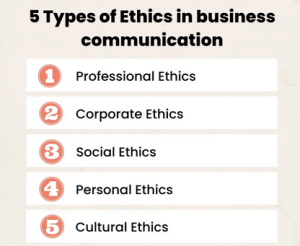Ethical issues in business communication arise when there are concerns related to honesty, transparency, fairness, and the responsible use of information. Maintaining ethical standards in communication is crucial for building trust, sustaining relationships, and upholding a positive corporate reputation. This research breaks down several ethical considerations in business communication:

Ethical Issues in Business Communication
Table of Contents
Toggle1. Truthfulness and Accuracy:
- Issue: Providing false or misleading information in communications.
- Ethical Principle: Communicate truthfully and ensure that information is accurate, avoiding intentional deception or manipulation.
2. Transparency:
- Issue: Withholding important information or being vague in communication.
- Ethical Principle: Be transparent and open in communication, disclosing relevant details that stakeholders need to know.
3. Confidentiality:
- Issue: Inappropriately sharing or mishandling confidential information.
- Ethical Principle: Respect the confidentiality of sensitive information and only share it with authorized individuals as needed.
4. Privacy:
- Issue: Violating individuals’ privacy in communication.
- Ethical Principle: Respect privacy rights and obtain consent before collecting or sharing personal information.
5. Respectful Communication:
- Issue: Using disrespectful language, tone, or gestures in communication.
- Ethical Principle: Communicate with respect, professionalism, and cultural sensitivity, avoiding offensive or discriminatory language.
6. Fairness:
- Issue: Providing biased or unfair information that favors certain individuals or groups.
- Ethical Principle: Ensure fairness in communication, presenting information objectively and without undue bias.
7. Inclusivity:
- Issue: Excluding certain groups or individuals from communication.
- Ethical Principle: Foster inclusivity in communication, ensuring that diverse perspectives are considered and represented.
8. Honest Advertising:
- Issue: Making false or exaggerated claims in advertising.
- Ethical Principle: Adhere to truth in advertising, providing accurate and verifiable information about products or services.
9. Social Responsibility:
- Issue: Ignoring the social and environmental impact of business activities.
- Ethical Principle: Communicate about social responsibility initiatives and address the impact of business operations on the community and environment.
10. Whistleblowing:
- Issue: Discouraging or penalizing employees who report unethical behavior.
- Ethical Principle: Encourage whistleblowing by creating a culture where employees feel safe reporting unethical conduct without fear of reprisal.
11. Managing Conflicts of Interest:
- Issue: Failing to disclose or address conflicts of interest.
- Ethical Principle: Clearly disclose and manage conflicts of interest to maintain transparency and prevent situations that could compromise integrity.
12. Digital Communication Ethics:
- Issue: Misusing digital communication channels for deceptive practices or cyberbullying.
- Ethical Principle: Adhere to ethical guidelines in digital communication, respecting online etiquette and promoting a positive online environment.
13. Handling Negative Information:
- Issue: Concealing or downplaying negative information that stakeholders should be aware of.
- Ethical Principle: Communicate negative information transparently, providing stakeholders with an accurate and complete picture.
14. Crisis Communication:
- Issue: Manipulating information during a crisis to downplay responsibility.
- Ethical Principle: Practice honest and transparent communication during crises, taking responsibility for actions and communicating steps taken to address the situation.
15. Intellectual Property:
- Issue: Using others’ intellectual property without proper attribution or authorization.
- Ethical Principle: Respect intellectual property rights, giving credit to creators and obtaining necessary permissions for use.
Conclusion:
Ethical business communication is fundamental to maintaining trust, fostering positive relationships, and upholding the integrity of an organization. Organizations that prioritize ethical communication not only comply with legal and regulatory requirements but also demonstrate a commitment to responsible and socially conscious business practices. Implementing ethical communication principles contributes to the long-term success and sustainability of businesses in an increasingly interconnected and scrutinized global landscape.
